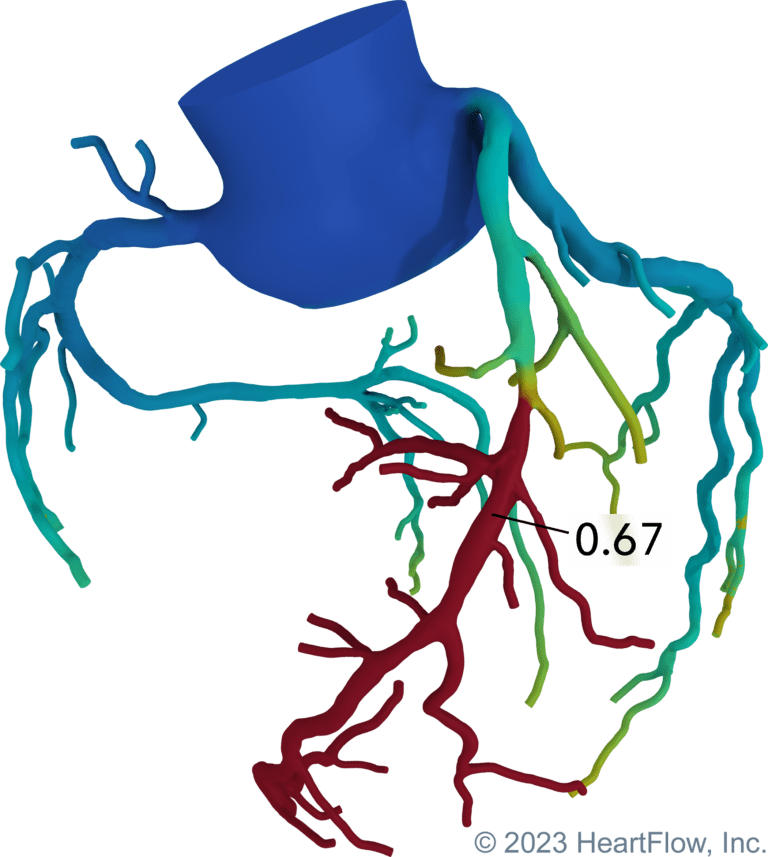HeartFlow is a medical technology company transforming the diagnosis and treatment of heart disease. We’re uniquely positioned at the intersection of healthcare and technology, leveraging cutting-edge technology to improve our product. Artificial intelligence, deep learning, cloud computing and computational fluid dynamics aren’t buzzwords to us – they’re foundational to our company and the engine driving the continuous evolution of our products.
The HeartFlow FFRCT Analysis starts when a patient undergoes a standard coronary Computed Tomography (CT) scan at a hospital or imaging center. The CT images are securely uploaded to our cloud. Next, we use advanced algorithms incorporating artificial intelligence to build a personalized, digital model of that patient’s coronary arteries. Our team of highly trained analysts then inspects this model, making any needed edits. Once this patient-specific model is completed, the HeartFlow pathway applies physiologic principles and computational fluid dynamics to compute the blood flow and FFRCT values at every point in the model. Throughout the process, we follow rigorous and well-established protocols to ensure consistent processing for every patient – no matter which site the data comes from.
The completed HeartFlow FFRCT Analysis is a color-coded, digital 3D-model of the heart, reflecting the impact that blockages have on blood flow. This model can be viewed both on web browser and on mobile. The entire process for receiving a HeartFlow FFRCT Analysis is conducted non-invasively, fits in with your current workflow and leverages the convenience of cloud computing for easy, and secure, data exchange.

At HeartFlow, we apply the latest in artificial intelligence (AI). One of the most exciting areas in the field of artificial intelligence is image analysis, with major advances in recent years in areas such as facial recognition and image searching. HeartFlow uses this same technology – an advanced form of AI called deep learning – to analyze CT images and help create a personalized digital model for each patient.
What makes deep learning so powerful is the fact that as the algorithms are trained on more data, the performance of future product improves. Today, our deep learning algorithms have been trained using tens of thousands of CT images, and our data set is growing rapidly. We also use the input of our expert analysts, as well as data obtained from invasive methods, to further train the algorithms. This leads to powerful population-based insights. And with an intelligent system doing the legwork, physicians have more time to focus on providing optimal care for each patient.

Dr. Robert Safian
Interventional Cardiologist
“We’ve been working with HeartFlow for a number of years, and it’s incredible how quickly the product turnaround times have improved. Coronary CTA is our default test for patients who come to the emergency room with chest pain where time is critical; the turnaround time is so fast for getting a HeartFlow Analysis now, that we’re piloting using CT and FFRCT together for clinically stable patients that present in the ED. The technology is sophisticated and precise, because they’ve incorporated artificial intelligence with machine learning. Without a doubt, HeartFlow is our gold standard.”

Our technology arms clinicians with actionable, highly-accurate information to aid in ensuring that each patient gets the treatment that is right for them.
Benefits of HeartFlow ONE’s Technology include:

Convenient
More than 50% of analyses are completed and returned within 2-3 hours or less*, which allows the HeartFlow FFRCT Analysis to fit into existing clinical pathways.

Consistent
Our standardized processes maintain the same level of quality for each and every patient.

Accurate
Data shows 86% accuracy vs. the gold standard of invasive FFR1.

Enhanced
Having a software-based product allows for rapid development cycles to respond to customer feedback regarding feature requests and defects.
Machines won’t replace physicians, but they absolutely can help. We think it’s time to take the best of technology and apply it to saving lives.
*As of 2023. Subject to change.
1 Nørgaard BL, et al. Diagnostic performance of non-invasive fractional flow reserve derived from coronary CT angiography in suspected coronary artery disease: The NXT Trial (Analysis of Coronary Blood Flow Using CT Angiography: Next Steps). J Am Coll Cardiol2014;63(12):1145-55.




HeartFlow Analysis is consisted of four main functions; FFRCT, Planner, Roadmap, and Plaque. All four functions are cleared for clinical use in the United States, Bahrain, Israel, and United Arab Emirates. Only FFRCT and Planner functions are cleared cleared for clinical use in Europe, United Kingdom, Australia, Canada, and Japan. Please see HeartFlow Analysis Indications for Use and Instructions for Use for more information.
© 2024 HeartFlow, Inc. | HeartFlow and the HeartFlow logo are registered trademarks of HeartFlow, Inc. Additionally, RoadMap is claimed as a trademark of HeartFlow, Inc. www.heartflow.com | 331 E Evelyn Ave, Mountain View, CA 94041
*Required fields
If you would like to request to have the HeartFlow Analysis available at a location near you, please submit your information below with details of the institution. We will share this information with the institution, but it will not guarantee HeartFlow will become available.
*Required fields
オンライン提出フォームから研究助成金を申請してください。
HeartFlow FFRCT 分析は、有資格の臨床医による臨床的に安定した症状のある冠状動脈疾患患者への使用を目的とした個別化された心臓検査です。 HeartFlow Analysis によって提供される情報は、資格のある臨床医が患者の病歴、症状、その他の診断検査、および臨床医の専門的判断と組み合わせて使用することを目的としています。
ハートフロー分析に関する追加の適応情報については、次のサイトをご覧ください。www.heartflow.com/indications.
さらに質問がある場合は、このメッセージを閉じてフォームに記入するか、サポート チームにお電話ください。: 877.478.3569.
The HeartFlow FFRCT Analysis is a personalized cardiac test indicated for use in clinically stable symptomatic patients with coronary artery disease by qualified clinicians. The information provided by the HeartFlow Analysis is intended to be used by qualified clinicians in conjunction with the patient’s history, symptoms, and other diagnostic tests, as well as the clinician’s professional judgement.
For additional indication information about the HeartFlow Analysis, please visit www.heartflow.com/indications.
If you have additional questions, close out of this message to complete our form or call our support team: 877.478.3569.Please use our online submission form on the Clinical Research Page to apply for research grants.
Thank you for your interest!

Executive Vice President and Chief Medical Officer
Campbell brings a wealth of experience to HeartFlow, where he serves as the Chief Medical Officer. Prior to joining HeartFlow, he was the Chief Scientific Officer and Global Head of Research and Development at Cordis Corporation, Johnson & Johnson, where he was responsible for leading investments and research in cardiovascular devices. Prior to Cordis, he was Associate Professor of Medicine at Harvard Medical School and the Harvard-M.I.T. Division of Health Sciences and Technology, and Director of the Cardiac Catheterization and Experimental Cardiovascular Interventional Laboratories at Brigham and Women’s Hospital. He served as Principal Investigator for numerous interventional cardiology device, diagnostic, and pharmacology trials, is the author of numerous journal articles, chapters, and books in the area of coronary artery and other cardiovascular diseases, and was the recipient of research grant awards from the NIH and AHA.
He received his A.B. from Harvard College and his M.D. from Harvard Medical School.